
The vibrant, diverse brain health community at Illinois is working to find solutions to some of today’s most pressing societal health challenges in fields including aging; learning, memory and plasticity; nutrition and cognition; neuroengineering; neuro-and socio-genomics; bioinformatics; and more. More than 300 faculty and staff on the Urbana-Champaign campus identify as researchers in the brain health space—regardless of their home department affiliation. These researchers are using leading-edge imaging tools, pioneering studies that progress from the lab to clinical applications with the goal of improving the health and lives of people everywhere. For fall 2020, we have expanded the spotlight to focus on the bright, dedicated graduate students and postdoctoral researchers who make up the next generation of innovators and leaders in our community.
Mickeal Key is a PhD candidate in the Neuroscience Program in the College of Liberal Arts and Sciences. working in the Decision Neuroscience Laboratory with Aron Barbey at the Beckman Institute. One of her active projects involves analyzing data from the Longitudinally Dynamic Biomarkers of Healthy Brain Aging in the Illinois Elderly Adult Cohort, an interdisciplinary study which was supported by the Center for Nutrition, Learning, and Memory. One of the key aims of this study is to understand the role of nutrition in the healthy aging brain. The data being analyzed are multi-dimensional in nature, including brain imaging via MRI, nutritional biomarkers, diet history surveys, inflammatory proteins, and a variety of cognitive assessments.
A second project Mickeal has been pursuing involves analyzing data from the INSIGHT study, a multi-modal intervention study in young adults. The aim of her project is to characterize the role nutrition might play in the relationship between measures of brain health (structure and function) and measures of cognitive function (decision making and fluid intelligence).
Mickeal's general research interests are in how genetic, metabolic, and lifestyle factors influence the brain across the life span. She wants to understand what predictive information diet, body composition, metabolic status, and inflammation status can provide to support healthy brain aging outcomes. Mickeal is also interested in understanding health disparities in cognitive aging and how to improve minority cognitive health outcomes.
Do you have a personal story to share or path that led to your interest in this area of study?
When I was a teenager, my only living grandfather was diagnosed with dementia and prostate cancer. While there were treatments for the cancer, there was nothing his doctors could do about the disease taking over his brain. My search to learn more about what was happening to my grandfather grew into a fascination with the brain in general and how it operates in both health and disease. Initially, I assumed I would need to pursue a career as a clinician to continue my quest for answers, but after spending 3 years as an undergraduate research assistant in a molecular genetics lab, I realized my path would be that of a research scientist.
How does being part of the University of Illinois and/or the Champaign-Urbana community impact your research?
The University of Illinois is a research powerhouse with an amazing neuroscience community that is using and developing state-of-the-art technology. This allows me to do research that leads to valuable knowledge about the relationships between nutrition, brain health, and cognitive function. Additionally, my research efforts have been greatly influenced by the resource-rich, collaborative, and interdisciplinary environment of the Beckman Institute. As a 2019 Beckman Institute Graduate Fellow, I worked with Dr. Aron Barbey and Dr. Elizabeth Stine-Morrow on a project to examine the impact of a genetic marker related to Alzheimer’s on functional brain connectivity and cognitive performance in older adults.
Recent news has pointed to the COVID-19 pandemic, systemic racism, and mental health as major societal health challenges. What part can researchers in your field play, in and out of the lab, in addressing these challenges?
The fact is that these health challenges are a by-product of a flawed system. I think what many people are realizing now is that if we want to move forward, we need to re-evaluate and push back against the status quo. Ultimately, the questions we choose to ask and the problems we choose to solve shape our scholarship and scientific knowledge, which in turn impacts education, healthcare, the economy, our government, and the judicial system. So, the more diverse the questioners and problem solvers, the more likely we are to overcome these challenges with equitable outcomes. For the researcher/academic, this looks like examining equity in the broader impacts of your research. It also looks like being intentional about diversity and inclusion in your lab, research collaborations, seminar speakers, faculty hiring, and student recruitment and retention.
Read more: Brain Health